|
|
|
|
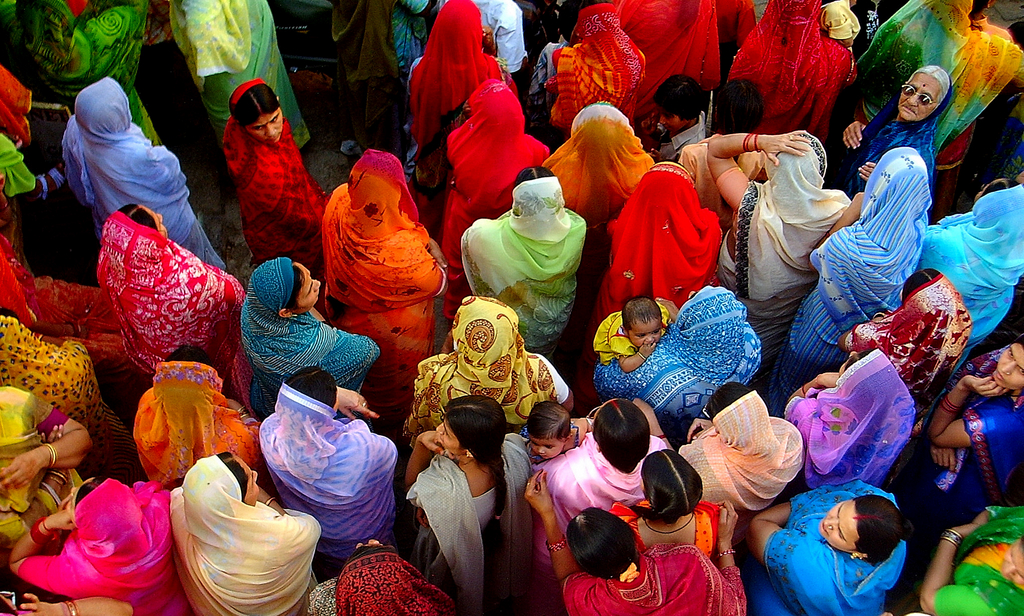 |
|
Gangaur
festival |
|
Introduction
of
Gangaur
Festival |
|
Gangaur is a very significant festival of Rajasthan. It starts on the
day following Holi and it lasts for 18 days. The festival is
celebrated with great enthusiasm and affection for Gauri the consort
of Lord Shiva by womenfolk, While married women worship Gauri, the
embodiment of perfection and marital love for the success of their
married life, unmarried women worship the Goddess for being blessed
with good husband. Gangaur Festival also celebrates marital fidelity,
monsoon, and Harvest. The word ‘Gangaur’ is literally made up of two
words, ‘Gana’ and ‘Gaur’. ‘Gana’ is identical with Lord Shiva and
‘Gaur’ which stands for Gauri or Parvati symbolizes Saubhagya (marital
bliss). Gauri is the image of brilliance and marital love.
Gangaur
is the most popular, colourful and important festival for people of
Rajasthan and it is observed throughout the state with great
enthusiasm and devotion by womenfolk. The festival is the celebration
of monsoon, harvest and martial fidelity. Women worship Gauri, the
consort of Lord Shiva. It is believed that after a temporary long
sacrament Gauri and Shiva reunited on this day. The tiny doll like
Idols of the Shiva and Gauri are made of wood. These godly male and
female entities are called ‘Isar’ and ‘Gangaur’.
The festival begins on Holi. The festival continues for many days..
The ladies decorate their hands and feet by temporary ornamentation by
drawing designs with Mehendi. After 7th day of Holi unmarried girls
carry clay pots with hole and a lamp shins inside, called ‘Ghudlia’ on
their head, singing songs in the evening.
They go around all the houses in the area and collect small
presents, sweets, cash, , jaggery, oil and ghee, etc. The women sing
religious song to the Goddess. A grand procession of marvelously
ornamented elephants, camels, horses and dancing people with happy
children & drummers carries the idol of Gauri in magnificently
ornamented gold and silver a palanquin.
|
|
Activities of Gangaur Festival |
|
A
parade is taken out to a garden, tank or a well with the images of
Gauri and Isar, put on the heads of married women at a good time in
the afternoon. Songs are sung about the departure of Gauri to her
husband's house. The parade comes back after offering water to the
image of Gauri, which faces toward the backs on the first two days.
On the last day of the festival, she faces in the same direction
as Isar and the parade comes to an end with the consignment of all the
images in the waters of a well or a tank. The women offer
farewell to Gauri and turn their steps homewards with tears in their
eyes and it marks the end of the festival.
|
|
Traditions of Gangaur Festival |
|
The first important tradition of the colourful festival of Gangaur is
the collection of ashes from the Holi fire and burying of wheat and
barley seeds in it. These seeds are the religiously watered every day
until the formation takes place. The tradition is performed with the
varying of pots of water on the head and songs of Isar and Gauri
(Shiva and Parvati).
A week after Holi, women build clay images of Gauri and Isar. The
tradition is made colourful and happy with the traditional folk songs
sung in admiration of Gauri.
Unmarried girls take out a procession with ghudlia and singing songs
associated to it on the evening of the seventh day after Holi. Ghudlia
is an earthen pot with holes around and a lamp inside. On their way,
the girls are gifted small presents like sweets, jaggery, ghee, oil
and a little cash. The ritual continues for ten days, upto the finale
of the Gangaur Festival. On the last day girls break their pots and
throw the remaining into a well or a tank and enjoy a fest with their
little collections.
During the last three days of the festival Gangaur Festival
celebrations reaches its peak. At this time women take special care to
beautify themselves and also the clay images that they had made.
Gangaur aptly reflects the rich cultural heritage of Rajasthan and is
celebrated with great pomp and show in Bikaner, Jodhpur, Marathwada
and Jaisalmer. Gangaur Festival is also observed at some places in
Gujarat.
|
|
When is Gangaur Celebrated |
|
For eighteen days during Chaitra (according to the Hindu calendar,
which usually falls in March or April. However, festival traditions begins the day after Holi.
|
|
Where is Gangaur Celebrated |
|
Gangaur is celebrated all over Rajasthan, and is one of the state's
most vital festivals. The most famous celebrations take place in
Jaipur, Udaipur, Jodhpur, Jaisalmer, Bikaner, and Nathdwara. In
Udaipur, Gangaur go along with the Mewar Festival.
|
|
How is Gangaur Celebrated |
|
The festival is mainly for women, who dress up in their best clothes
pray for a husband of their choice, or the welfare of their husbands.
On the last couple of days, colorful processions of decorated images
of the goddess Gauri wind their way all over cities and villages,
accompanied by local bands.
In Udaipur, there's a boat procession on Lake Pichola, and fireworks.
Women balance several brass vessels on their heads add to the
interest. The occasion ends with fireworks on the banks of the lake.
Early in the morning in Jodhpur, thousands of maidens dress up, sing,
and carry water and grass in pots.
In Jaipur, the ceremony of the traditional procession starts out from
the Zanani-Deodhi of the City Palace. It passes through Tripolia
Bazaar, Chhoti Chaupar, Gangauri Bazaar, Chaugan stadium, and finally
assemble near the Talkatora. Elephants, old palanquins, chariots,
bullock carts, and folk performances are all part of it.
|
|
Significance |
Held in the
honor of Goddess Gauri.
|
|
Regional Celebrations Of Gangaur |
|
Gangaur is a religious festival that reflects the superb cultural
heritage of Rajasthan. This festival is celebrated with great ceremony
and show in Bikaner, Jodhpur, Marathwada and Jaisalmer.
Jaipur
The Gangaur festival of Jaipur is worldwide famous for its joyous and
cheerful happenings. A particular kind of sweet dish called ‘ghewar’
is made which is a feature of the Gangaur festival. People like ghewar
very much and also distribute it among their friends and relatives. A
sawari or parade of Gangaur starting from the Palace gate known as
Tripolia moves through the city streets passes through Chaugan. plenty
of visitors and villagers view the procession and like its beauty.
Bikaner
Married women and maidens fast during the festival. They made sweet
dishes, carry them to a well, make an offering thereof to the goddess,
and return home and distribute these as 'prasad' to all.
Jodhpur
A fair of 'lotias' which is a typical feature of the Gangaur
celebrations go together with other celebrations in Jodhpur. Early in
the morning, thousands of maidens, covered in dressed in beautiful
costumes, singing melodious songs, bring water and 'durva' grass in
silver or brass pots to a place known as Girdikot. A huge amount of
citizens are watching the celebration.
Nathdwara
The procession of Gangaur continues for 7 days in Nathdwara. Each day,
a particular colour is chosen for the dress of the goddess. On the
last day of the festival, the women dressed in black with the
decoration of golden lace on it carries similarly dressed idol of
Gauri. This denotes the final departure of Gauri.
Udaipur
The idols of Isar and Gauri are taken to the Pichhola Lake in a
procession, thereafter they go around the lake in a boat, for an hour.
A amazing and luminous show of fireworks marks the end of the ceremony
on the banks of the lake.
Banswara
In Banswara, the sawari of Gangaur or procession is taken out from the
Zenana Deorhi to Singhvashi Chowk. Traditional religious ceremonies
are held around the areas within the palace compound.
|
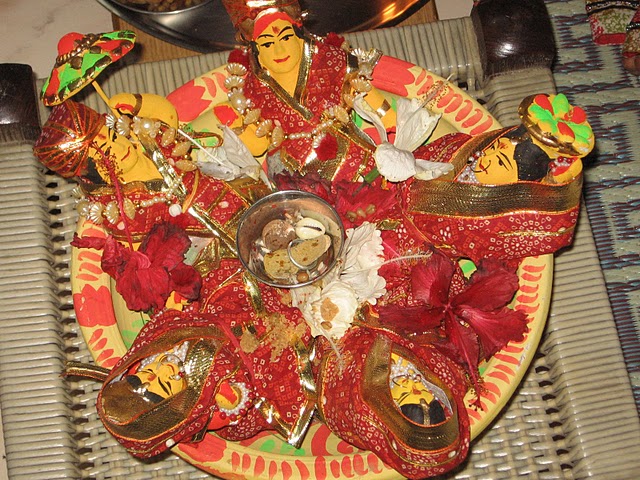 |
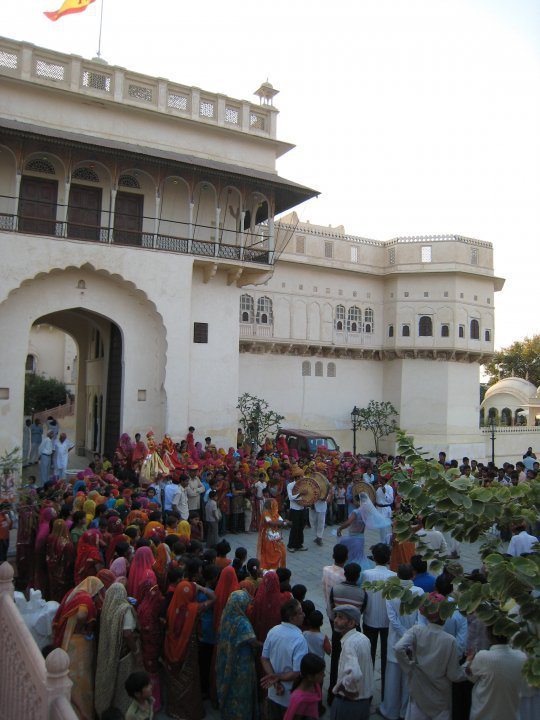 |
|
Gangaur Pooja |
Gangaur Festival Celebration |
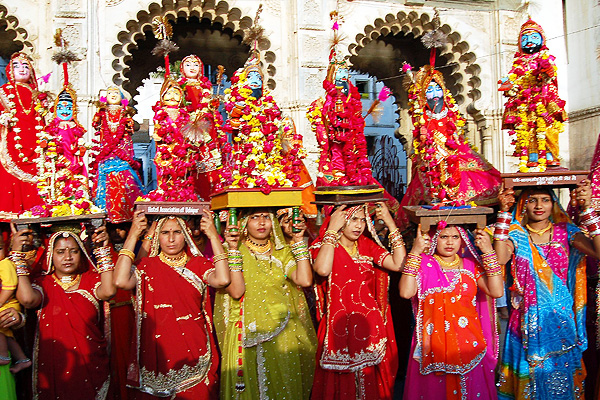 |
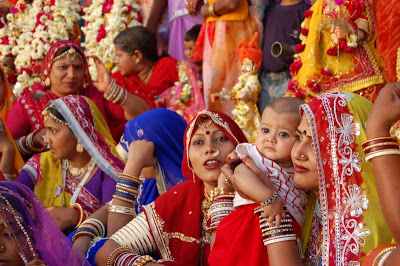 |
|
Gangaur Festival of
Rajasthan |
Gangaur Festival of
Rajasthan |
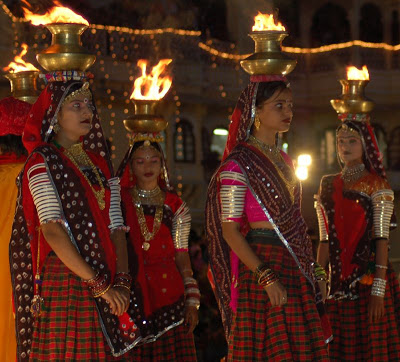 |
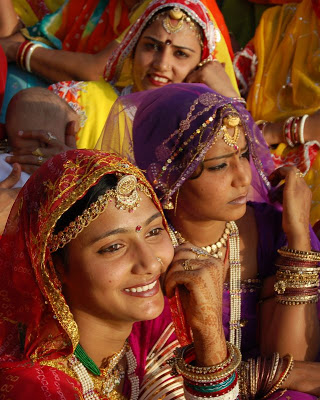 |
|
Gangaur Festival of
Rajasthan |
Gangaur
Festival of Rajasthan |
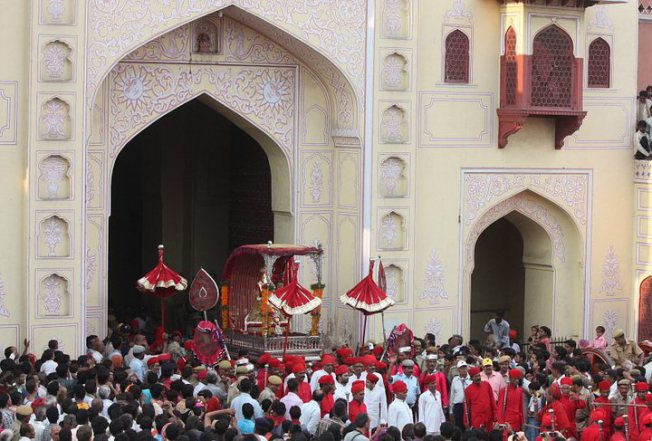 |
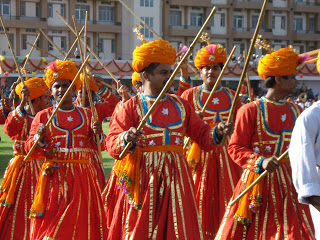 |
|
Jaipur Gangaur
Festival |
Gangaur Festival of
Rajasthan |
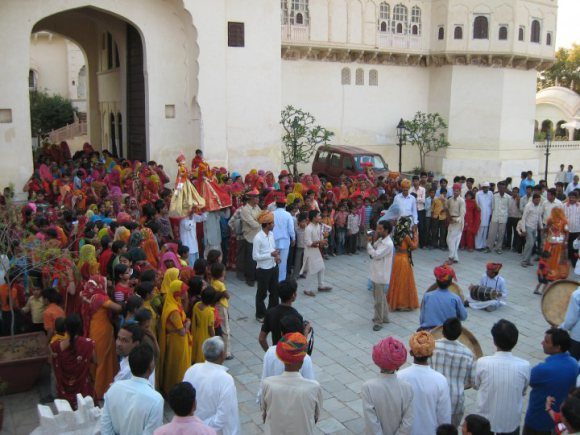 |
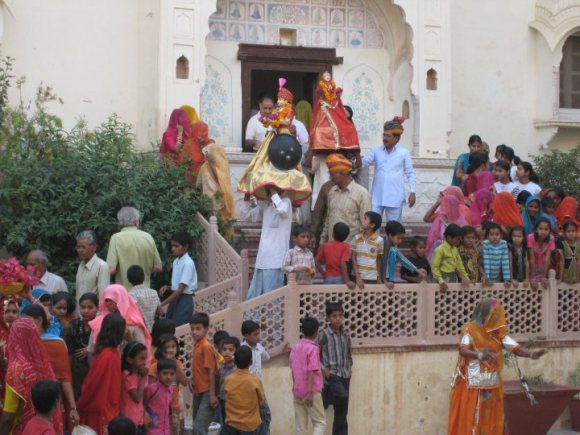 |
|
Gangaur Festival
Celebration |
Gangaur Festival
Celebration |
|
|
|
|
|
|
|
|